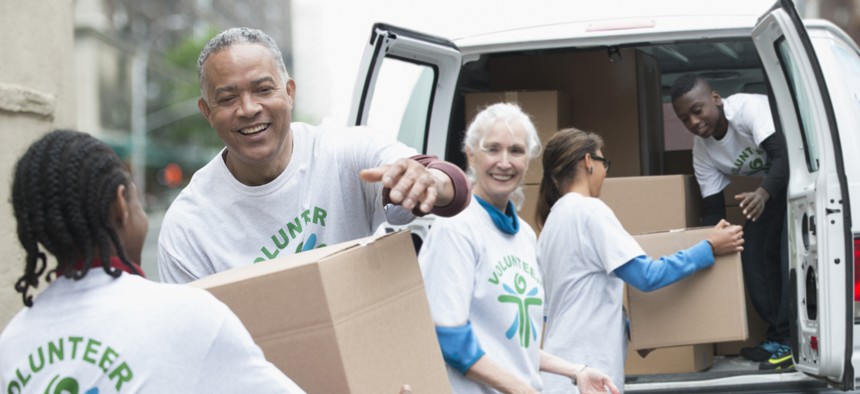Opinion
Opinion: New York City should give human services workers a pay raise
This vital work serves as the backbone to so many lives in the city.

Volunteers of America-Greater New York wants a 6.5% pay raise for human services workers in the New York City budget. Jose Luis Pelaez Inc./Getty Images
A New York City without human services workers would be a bleaker city. There would be nobody to staff our food pantries, nobody to help survivors at domestic violence shelters, nobody to watch children after school and nobody to connect seniors with resources they need to age in place. In other words, the human services workforce is a vital part of New York City’s critical human infrastructure.
On May 25, New York City human services workers from more than 100 nonprofit organizations united in a massive show of force to communicate to elected officials and the broader public that the status quo was not working.
For one day – the Human Services Council’s “Day Without Human Services” – these organizations committed to reducing service levels to demonstrate the value and necessity of our city’s human services workers, who are considered essential because they serve on the front lines to keep New Yorkers safe. In fact, these workers are so essential that the reduction had to be done with care, ensuring sufficient staff were still accessible to our clients. On the same day, 6,000 of my colleagues from across the sector rallied outside City Hall to demand fair wages.
While awe-inspiring, this show of unity was bittersweet because it should not have been necessary in the first place. Now, City Hall has an opportunity to address a long-standing inequity rooted in city government policy. It should not delay in supporting a workforce that responds to the most critical challenges facing New Yorkers today.
That starts with including a meaningful 6.5% cost-of-living adjustment for human services workers in the final city budget. Salaries for nonprofit human services workers, whose wages are typically set by government contracts, lag far behind those of their similarly credentialed peers in other sectors. Human services workers employed by the nonprofit sector are paid an astounding 30% less than their equivalents in other sectors, even though they spent the past few years working tirelessly in the face of the pandemic, a rising homelessness crisis and, most recently, the influx of thousands of asylum-seekers.
This is not just a matter of pay, but one of fairness and equality: 75% of human services workers in New York City are people of color and 70% are women, making them more likely to experience pay inequity. Budgets are reflective of values and priorities, and there is no reason to perpetuate and codify the long-standing racial and gender wealth gap in New York City through public policy.
It’s also more expensive than ever to live in New York City. Over the past year, New Yorkers’ paychecks haven’t gone as far as they once did, with inflation driving up costs and a housing crisis pushing rent to record heights. That means that many of the human service workers serving the lowest-income New Yorkers have been unable to make ends meet, some even qualifying for the same services as the clients they serve.
And while many workers feel a righteous call to action that brings them to the human services field, the satisfaction that comes with doing this work does not pay the rent, cover health care costs, provide money for retirement or prepare kids for college. The eroding purchasing power of staff salaries in a high cost-of-living environment is already causing a massive shortage of available talent, depriving the human services sector of workers who can’t afford to enter or stay in the field.
With the promise of higher wages in the private sector, many human services workers have had to choose between a more meaningful career and earning a living wage. This has driven unsustainably high turnover rates and vacancies in behavioral health, shelter and affordable housing support positions. Staffing shortages result in longer hours and larger caseloads for the workers who remain in the sector, which drives burnout and makes it difficult to justify continuing to work in human services. These dynamics are prevalent across the sector and place a question mark around the future of this workforce: Who will step up to provide services when the next crisis hits?
The hard work, talent and expertise of human services workers are critical to the social fabric of our city. A cost-of-living adjustment would allow city-contracted human services organizations like Volunteers of America-Greater New York to offer competitive wages to sustain our experienced and dedicated workforce. It is not realistic to expect human services workers to continue to pursue this career path – which requires an exceptional level of skill and emotional labor, plus often costly graduate degrees – under their current salaries.
We saw the strength that the human services workforce wields on the Day Without Human Services, and the city government can ensure that we never have to know a city without these workers by including a 6.5% cost-of-living raise in this year’s municipal budget.
The city has many promising policy proposals in the works that have the potential to allow us to make huge strides in helping our neighbors most in need, but they cannot be realized without the human services workforce. Paying essential human services workers a living wage should not be controversial. Now, it’s up to the city to make this a reality.
Noelle Withers is executive vice president and chief program officer of Volunteers of America-Greater New York.
NEXT STORY: Opinion: Albany, stop making excuses for keeping basement homes unsafe
